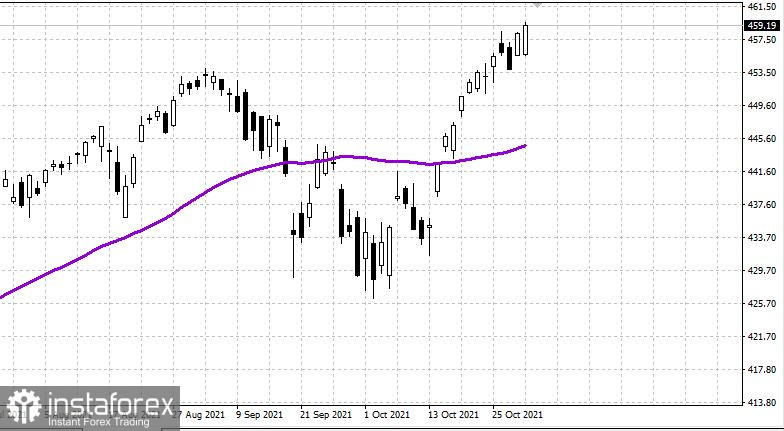
S&P500
The US market closed the week at year's highs ahead of the Fed. The dollar strengthened sharply.
At the close of last week US indices showed gains. The Dow added 0.25%, the NASDAQ rose 0.3%, and the S&P500 was up by 0.2%.
Japan's market showed strong gains on Monday morning. The Nikkej index added 2.6% and China's indices were down moderately by 0.3%.
Oil lost momentum following last week's weak Q3 US GDP report. Brent crude has fallen by around $3 and is trading around $83.50.
The gas crisis in Europe has eased a bit after Russian leader Putin promised that Gazprom would increase gas deliveries to Europe. This has also been influenced by statements by Gazprom head Miller that supplies will actually increase after November 7. Gas prices outside long-term contracts fell sharply at the end of last week to $900 per barrel. In Europe, the weather is still warm and there is no surge in demand for gas.
The infection rate is slowly decreasing. More than 327K new global cases were reported yesterday.
The S&P500 index is trading at 4,605 and is expected to be in the 4,570–4,620 range. Investors staged a sell-off of technology leaders. Apple and Amazon fell as much as 3.5% in trading on Friday. Companies reported shortages of electronic components as a possible reason for the deterioration of sales and profit margins. The United States and European Union have agreed to end a dispute over US steel and aluminum tariffs imposed by former President Donald Trump in 2018.
The big news in the new week is the Fed's decision on Wednesday. Everyone is waiting for the official announcement to begin reducing growth support programme in the amount of $120bn a month. The market is waiting for the text of the Fed's decision and will study it closely. The ISM manufacturing index for October will be released today. It is expected to fall to 60.2% from 61.1% last month. On Wednesday and on Friday the employment reports for October will be released. The number of jobs is expected to rise by 400K.
The G20 summit was held in Rome over the weekend. The key topic was a common agenda to combat global warming. Developed countries are pushing forward a plan to achieve zero carbon emissions by 2050. Biden is trying to take the lead in this programme. However, disagreements with China and Russia have prevented specific emission reduction targets from being adopted at this meeting.
USDX is trading at 94.18 and is expected to be in the 94.00–94.50 range. The dollar turned sharply higher on Friday after the new US inflation report. The report showed that inflation remains at a high level. The benchmark US PCE index was 3.6% in October. This leaves the Fed with no choice but to switch to a tightening of monetary policy and eventually to a rate hike. Against the background of the approaching Fed meeting, the dollar's reversal effect was particularly noticeable. The euro made its strongest move against the dollar since June 16. It completely reversed from rising to falling overnight, from 1.1690 to 1.1540.
USDCAD is trading at 1.2390 and is expected to be in the 1.2350–1.2450 range. The rally in the dollar halted the pair's fall and oil's pullback from the highs. The pair's future prospects still depend on how the dollar and oil price will react to the Fed's decisions.
The week is off to a quiet start with investors waiting for decisions and announcements from the Fed, US economic and employment reports.





















